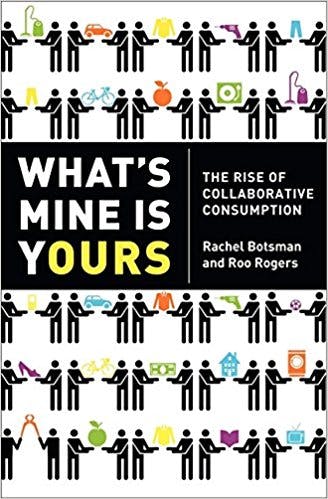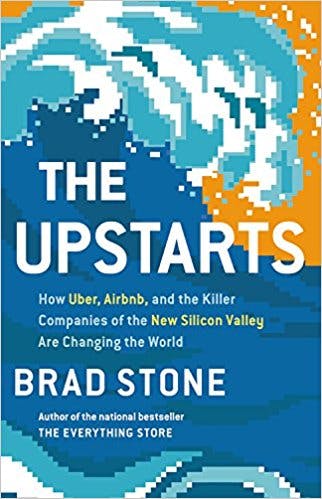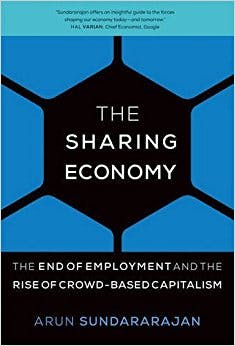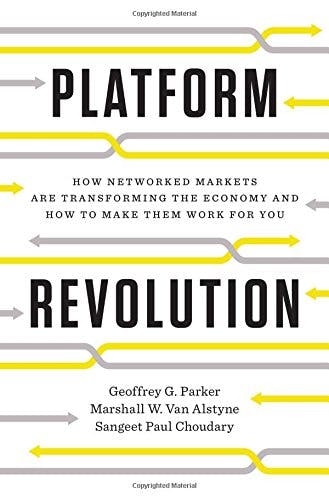Five must-read books for marketplace entrepreneurs
Our CEO Juho picked the five books he strongly recommends to all marketplace entrepreneurs.
Published on
Last updated on

If you're thinking about starting a marketplace business, reading a book on the topic is a solid way to build context. There are several great books that can help you understand the unique dynamics related to online marketplaces, the sharing economy, and platform businesses in general.

What's Mine Is Yours: The Rise of Collaborative Consumption
Rachel Botsman and Roo Rogers (2010)
In their 2010 bestseller, Rachel Botsman and Roo Rogers define a phenomenon that would later be dubbed the sharing economy by the media (Botsman and Rogers don't use this term themselves—they preferred "collaborative consumption"). In the book, they tell the stories of small, emerging marketplace companies like Airbnb and TaskRabbit that help individuals get goods and services directly from each other through peer-to-peer marketplaces, bypassing the traditional middlemen. They paint a picture of a world that increasingly prefers access over ownership.
The book started a media phenomenon and a movement. Over the years, I've met dozens of people in the sharing economy scene who told me this book changed their life. Many of them quit their job to join the growing movement, be it by starting their own peer-to-peer marketplace, joining an existing one, or in some other way. While I had already launched my first sharing economy marketplace when the book came out, it was a huge source of inspiration: it helped me fully understand how big this thing could really be someday.
A lot has happened in seven years, and many of the companies and projects discussed in the book are long gone. However, the book has stood the test of time, and remains as timely today as ever. If you're considering building a sharing economy platform, this book is a great place to start learning about what the movement is all about.

The Upstarts: How Uber, Airbnb, and the Killer Companies of the New Silicon Valley Are Changing the World
Brad Stone (2017)
If Botsman's and Rogers' book is idealistic and enthusiastic about how the sharing economy can bring about positive change, The Upstarts observes things from a business perspective. Brad Stone—Bloomberg journalist and the author of the "Amazon book", The Everything Store—recounts the breathtaking growth stories of Airbnb and Uber in a compelling manner, including plenty of delicious details and anecdotes.
It's inspirational to learn how both of these companies begun their journey as a scrappy side project that eventually ended up doing what most startups aspire to do but few achieve: truly changing the world. The Upstarts details their path, starting from the very beginning up until the brink of an IPO—the hacks and hustles they used to grow their businesses and the clever strategies they deployed to solve the chicken and egg problem all marketplaces must overcome.
The book also reveals the gruesome side of things: all the suspicious or even borderline illegal tactics that both companies have used to grow their business, and how they have both, on several occasions, put their own business interests before the interests of their users or society at large. It looks beyond their shiny sharing economy branding and reveals the ruthlessness of the startup world and what it truly takes to build a multi-billion dollar business.

The Sharing Economy: The End of Employment and the Rise of Crowd-Based Capitalism
Arun Sundararajan (2016)
If Botsman is the idealistic thought leader and Stone the voyeuristic journalist, Arun Sundararajan—whom we interviewed earlier—looks at the sharing economy and marketplaces through an academic lens. Dubbed "the sharing economy professor", NYU Stern professor Sundararajan approaches his topic not only through his own observations and interviews but by digging through research conducted by countless scholars.
This is not a book that offers practical advice that can be applied directly to your marketplace business. Instead, it offers a broader view of the big societal and economic shift that has taken place since Botsman and Rogers published their book. In 2010, no scholar had yet studied this new phenomenon. Since then, a myriad of research has been done on the sharing economy and its implications. Sundararajan's book recounts the most important takeaways from these studies.
Sundararajan acknowledges both the benefits and the challenges of the sharing economy and tries to find a middle ground. He is an optimist who believes that despite the challenges the sharing economy and the current behemoth platforms pose to society, the shift is still ultimately positive. He also discusses what the future might hold for the sharing economy and what kinds of implications technology like blockchain may have.

Platform Revolution: How Networked Markets Are Transforming the Economy—And How to Make Them Work for You
Geoffrey G. Parker, Marshall W. Van Alstyne and Sangeet Paul Choudary (2016)
If you're looking for tangible advice that helps you build your marketplace business model, you're in for a treat. Parker, Van Alstyne, and Choudary are experts who have been studying and helping platform businesses for more than a decade. In their book, they focus on codifying the underlying design principles of successful platforms into an easy to understand form for others to apply.
This is not a book only about marketplaces. By "platform", the authors mean any business model that is based on enabling interactions between producers and consumers. This is in contrast to "pipes", the more traditional business model where a company produces goods or services and sells them to consumers. The platform business doesn't produce the goods or services itself, it simply provides tools for others to connect and exchange.
Two-sided marketplaces are a typical example of platform businesses, but social media businesses like Facebook and Twitter are also platforms. So is Apple's App Store and Google's entire Android ecosystem. All of this helps create value by bringing producers and consumers together. Many of the common challenges marketplaces face—like overcoming the chicken and egg problem—apply to all platform businesses.
If you'd prefer a guide that takes the hands-on approach one level further and focuses on applying these design principles to marketplace businesses specifically, I recommend Marketplace Academy's Practical guide for building an online marketplace business. It's not a book (yet – stay tuned!) but a series of long-form articles that take you through a series of concrete steps for launching and growing an online marketplace platform.

Ours to Hack and to Own: The Rise of Platform Cooperativism, A New Vision for the Future of Work and a Fairer Internet
Edited by Trebor Scholz and Nathan Schneider (2016)
After reading about the benefits of marketplace platforms and how to build successful ones, it's a good idea to spend some time reflecting on how they should be owned and governed. All the previously mentioned books address this theme: they discuss the dangers of rogue platforms that use their network effects to build monopoly businesses and put the interests of their shareholders before the common good. However, while all these books acknowledge the problem, they all fall short in proposing concrete solutions.
Ours to Hack and to Own sets out to provide a solution. It proposes the concept of platform cooperativism: a model where the platforms are owned by people who use them. Imagine a local Uber owned by taxi drivers who are organized as a cooperative, or a local TaskRabbit owned by the taskers. The most prominent example of such platforms is Stocksy, a cooperative stock photography platform owned by the photographers, that has had strong growth and has its revenue in the millions.
The book features essays from a number of authors who examine the concept of platform cooperativism from different angles, at times even disagreeing with each other. As Richard Bartlett notes in his review of the book, the approach works well in facilitating the much-needed discussion between two groups: technologists and startup enthusiasts who influence the future, and activists, and academics who have studied the lessons from the past.
As the editors of the book note, it's important to acknowledge the benefits and efficiencies the platform technology has brought, and figure out a way to keep those benefits while mitigating the downsides of the platform economy. Instead of simply criticizing the behemoths and telling them what not to do, Ours to Hack and to Own focuses on painting a vision of a viable alternative—something to say "yes" to.
You might also like...

What you need to know to plan your marketplace business
An introduction to online marketplaces. What they are, why they are booming, and why you should build one.

10 marketplace thought leaders you should follow
A list of 10 important marketplace thought leaders to follow in this rapidly changing industry.

10 marketplace founders you should follow
A list of ten marketplace founders, who remain CEOs of their successful marketplace companies. Follow them for inspiration and advice.
Start your 14-day free trial
Create a marketplace today!
- Launch quickly, without coding
- Extend infinitely
- Scale to any size
No credit card required
